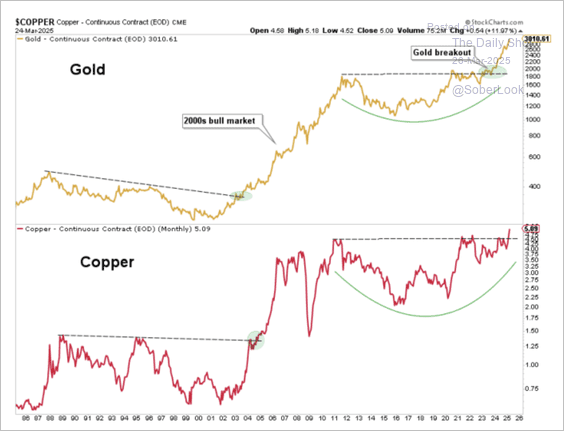

At Porter & Co. we are determined to be your best source of investing, economic, and financial insight, and your first choice for information about what to do with your money… in the entire world, bar none.
This is Porter & Co.’s Sunday Investment Chronicles. Every week, the Porter & Co. research team pores over thousands (and thousands) of articles, reports, social media posts, analyses, regulatory filings, and anything else we can get our hands (and eyes) on to understand what’s happening in the world of investing and finance – and to uncover the most original, compelling, and double-head-fake ideas…
… and we curate the best of those here. We do it all the old fashioned way: Hours of reading and brainpower (no AI curation here). We read everything – for you.
In Case You Missed It
In Monday’s Daily Journal, Porter & Co. senior analyst Ross Hendricks continued his three-part series about America’s “two-tiered economy” to examine a key vulnerability: the end of the wealth effect created by the greatest bull market of the last 50 years. The percentage of U.S. household financial assets invested in equities has risen – particularly for the wealthiest 10% of the population – to an all-time high… And the concentration of the market has intensified. A startling reality about recent stock market performance is that the Magnificent 7 account for most of it…
Over the past two years, the S&P 500 has notched back-to-back gains exceeding 20%. But if we strip out the performance of the Mag-7, the index would have returned a paltry 5% on average in each of those years. That’s about on par with the returns of risk-free Treasury bills, and barely keeping pace with inflation…”
In the next Daily Journal on Wednesday, Ross explained how the seven stocks that have accounted for the vast bulk of market returns are on shaky ground. The boom in artificial intelligence that has fueled enthusiasm for shares of these companies has so far been a black hole of capital expenditures – and turned these one-time capital-efficient companies into capital-intensive companies. This, when combined with the impact of stock-based compensation – which by accounting rules don’t impact cash flow, though the reality is that stock-based compensation does divert resources from shareholders – highlights the dramatic overvaluation of the Magnificent 7 on a cash flow basis. What does it all mean? It’s not difficult to see how a recession-driven earnings decline and a contraction in the multiple that investors are prepared to pay for stock could result in a 50% decline in share prices.
That said… as we point out in Thursday’s The Big Secret On Wall Street portfolio review, there are still ample opportunities in markets today. In particular, we highlight stocks in The Big Secret portfolio that are down sharply… To explain, we said:
These businesses are facing either temporary operational challenges, cyclical downturns in their industries, or investor pessimism that’s sent their share prices down even while earnings continue to grow. In each case, we believe the market has pushed the prices of these shares down to virtually no-risk buy levels.”
Also on Thursday, Erez Kalir issued two sell recommendations to subscribers of Porter & Co.’s Biotech Frontiers. The stock of one small drug maker had risen more than 100% since being recommended in July, so Erez suggested selling half a position to lock in gains. However, shares of the other company, a small biotech that has created a highly innovative synthetic blood vessel, had dropped 40% over a few days after a dilutive capital raise and new reports of safety concerns for its main product. Determining that this alters the risk/reward for the worse, Erez wrote: “In such situations, discipline calls on us to exit.”
And Porter concludes Friday’s Daily Journal by saying,
By 2028 the government will still be spending $8.6 trillion a year and continuing to rack up bigger deficits. There will not be a single year where spending actually declines… Why? Simple: Social Security is a Ponzi scheme. And the entire Treasury market will, eventually, collapse as this reality becomes clear.
Tariffs, a trade war, and unsustainable levels of U.S. government spending and debts will destroy the entire global financial system in the next four years.”
The Best Things We Read Last Week
Out of the hundreds of sources of investment, finance, and economics news and insight we regularly review – our Bloomberg terminal, hedge-fund letters, annual reports, the financial news media, Securities and Exchange Commission (“SEC”) filings, investment newsletters, newspapers, X (Twitter) threads, conferences, podcasts, and more – here’s what we’ve read that we think you might find interesting.
Markets And Economics
The Legends Speak
Investment Ideas
SPONSORED BY ONEBLADE: A $10 Million Shave?

Ten years ago, a single shave cost Porter $10 million…
It all started in Rimini, a remote Italian village on the Adriatic coast. In a dusty, old barbershop that could’ve been a front for the mafia, Porter experienced what he calls the perfect shave. Ever since that shave, Porter became obsessed with getting the same shave at home. Ten years and $10 million later, he created OneBlade – the world’s finest safety razor. A razor that redefines shaving perfection. Today, you can try the OneBlade Genesis, use STANS15 for 15% off, exclusive for Porter & Co. readers.
Special Situations: Activist Investing, Spinoffs, Arbitrage, Mergers and Acquisitions (M&A), And More
Energy
The ’23 Enigma’: The Most Powerful Monthly Pattern in the Market
Every 23rd day, a powerful market anomaly occurs. Now, you can learn how to exploit it for potential payouts of as much as $9,550, $12,150, and even $18,400 within a month starting with as little as $5,000.

